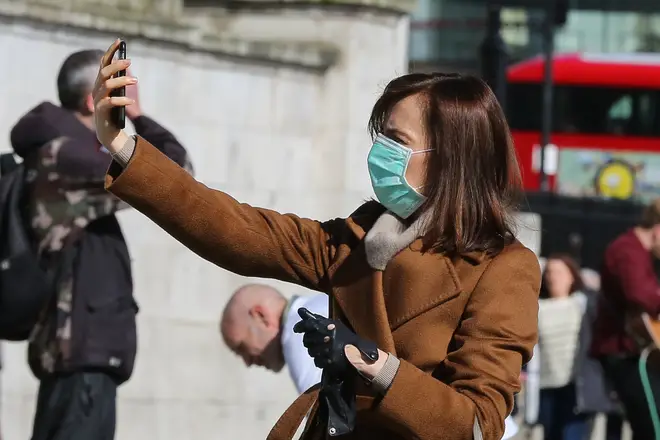
Iain Dale 10am - 1pm
25 March 2020, 07:46 | Updated: 25 March 2020, 07:51

With the Prime Minister placing the country into lockdown and saying people should stay in their own homes as the Covid-19 crisis worsens many are asking who should self-isolate?
Boris Johnson has issued a series of strict measures for all Brits to tackle the coronavirus outbreak.
He addressed the nation to tell Brits to stay at home, announcing new limits on shopping, and going out in public that will last for at least three weeks.
The PM said that those with the most serious health conditions, who are most vulnerable to the virus, should be shielded from contact for up to 12 weeks from the weekend onwards.
He has also urged Brits to work from home from now on.
Read more: How long does Covid-19 live on surfaces? Is post from China safe?
If one person in a house has symptoms, including a continuous cough or fever, the whole family should stay at home for 14 days.
They should avoid even going to the shops to get essentials, the Prime Minister said.
People should only go out for exercise and ensure they do not come into contact with people while doing so.
Read more: Coronavirus symptoms - What are they and what is the risk of Covid-19 in the UK?
In coming days, everyone classed as vulnerable will be asked to ensure they are "largely shielded from social contact" for around 12 weeks, or possibly longer.
This includes people over the age of 70, pregnant women and people with certain health conditions.
Read more: Coronavirus: Beard sanitiser sales spike after NHS urged staff to shave
Government guidance says those who are at increased risk of severe illness from coronavirus should be particularly stringent in following social distancing measures. This group includes adults under 70 who would qualify for a flu jab due to an underlying health condition.
They include people with chronic (long-term) respiratory diseases, such as asthma, chronic obstructive pulmonary disease (COPD), emphysema or bronchitis; chronic heart disease, such as heart failure; chronic kidney disease; chronic liver disease, such as hepatitis; chronic neurological conditions, such as Parkinson's disease, motor neurone disease, multiple sclerosis (MS), a learning disability or cerebral palsy; diabetes; problems with the spleen, such as sickle cell disease or if the spleen has been removed; a weakened immune system as the result of conditions such as HIV and Aids, or medicines such as steroid tablets or chemotherapy; or being seriously overweight (a BMI of 40 or above).
Read more: Coronavirus UK: Do surgical face masks work to avoid virus symptoms?
"Many people, including millions of fit and active people over 70, may feel that there is something excessive about these measures, but I have to say that I believe they are overwhelmingly worth it to slow the spread of the disease, reduce the peak, to save life, minimise suffering and give our NHS the chance to cope," Mr Johnson said.
Prof Whitty said that including pregnant women in this group was a "precautionary measure" as experts are "early in our understanding of this virus".
Although older people are at a higher risk of being infected, children can still catch the illness, the World Health Organisation said.
It added: "While the vast majority have experienced mild disease, some have experienced severe or critical disease and some young adults and one child, that we are aware of, has died."
Read more: Family self-isolated due to 'people’s fears' over coronavirus
The period of self-isolation for people who live on their own remains at seven days.
Sir Patrick Vallance, the Government's chief scientific adviser, said: "If you are ill with symptoms of the new, persistent cough or fever you isolate for seven days. If you lived on your own, that's what you would do.
"Now what we're saying is if anybody in the household gets it, the whole household stays together isolated for 14 days. The reason for that is the other people may pick it up over five days or seven days and then they've got seven days to have it and get better."
Mr Johnson added: "It's the difference between individual isolation and household isolation."
Read more: ‘Don’t die, please buy’ Glasgow newsagent sells out entire stock of coronavirus face masks
Schools remain open at the moment. The Government's chief scientific adviser Sir Patrick Vallance said other measures may be necessary - including school closures - at some point.
"Those things need to be done at the right time," he said.
The Prime Minister said the peak of the epidemic is coming faster in some parts of the country than others. "It looks as though London is a few weeks ahead," he said.
Prof Whitty said measures to tackle the spread of the disease would need to be in place for a "prolonged period".
"This is going to go on for some time," he said. "We should not be under any illusions that 'if we just do this for a couple of weeks that is sufficient'.
According to the latest government advice, you should not go to a GP, pharmacy or hospital.
Testing for coronavirus isn't needed if you're staying at home.
Plan ahead and ask others for help so you can stay at home. Also consider what can be done for vulnerable people in the household.
Ask your employer, friends and family to help you to get the things you need to stay at home.
But if you cannot cope with your symptoms, or your condition gets worse, or you do not get better after seven days then call NHS 111 or for a medical emergency call 999.